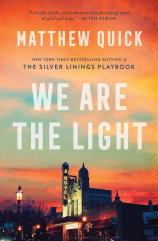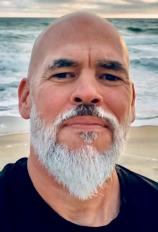Reading Group Guide
Discussion Questions
We Are the Light

1. Lucas writes that Karl, his analyst, was the first person besides his wife to ever say to him “I love you” and mean it. Karl loved him in the way that “the best part of my soul loves the best part of your soul,” a phrase that becomes a refrain throughout the book. What is the power of this type of love as seen in the book, and how is it distinct from romantic or familial love? How is it different from the love that is earned through one’s actions?
2. In the aftermath of the movie theater tragedy, Lucas is consoled by his vision of the victims turning into angels, and takes comfort from the following visitations of his wife in the form of an angel. He believes that it would “be cathartic for everyone to understand that their loved ones did not suffer and were not afraid, but were instantly transformed into higher beings who were far more beautiful and enlightened than humans could ever be.” In which ways is this angelic secret constructive to Lucas, and in which ways is it detrimental?
3. “I wish there was something we could do, other than be angry,” the survivors say to Lucas in the months after the tragedy. How is anger treated in the book? Can it ever be a force for good?
4. Lucas can’t bring himself to return to his work at the high school, so Eli seeks him out at home. Lucas writes that Eli’s anguish “made me feel guilty about abandoning him and all of the students who relied on me the way I relied on you, Karl. The irony is not lost on me.” How does the help that Eli needs from Lucas compare to the help that Lucas needs from the absent Karl? How did you feel about Karl as you read the book, and how did your feelings change by the end?
5. Sandra Coyle urges Lucas to give up helping Eli make his amateur film project and come work for her anti-gun political crusade instead. She tells Lucas, “If you want to be part of a real solution, if you want to really honor Darcy, you’ve got to put childish things aside and be a man.” How does her idea of “being a man” differ from the ideas expressed by Lucas, Karl, Isaiah and others?
6. Lucas goes to great lengths to help Eli carry out his monster movie project, guiding and partnering with him to make the whole thing possible. But before they hatch a plan of action, Lucas helps lift Eli’s pain by simply keeping him company without saying a word: “We sat in silence for a long time, quietly looking at each other.... As I sat in the tent with young Eli, I could feel his pain and frustration and loneliness leaving his body.” What does this book teach us about the different ways of helping someone to heal? How does the rest of the town later pitch in to help Lucas?
7. Lucas insists that “No one in our movie is good or bad.... Just true depictions of whole people, each with both a shadow and a light side.” The fictional scripted movie doesn’t match the messiness of reality, or does it? In real life, Lucas still refuses to vilify Jacob Hansen, because he doesn’t believe that anyone, even Jacob, is entirely bad. Do the other characters in the novel agree with him? Why do you agree or disagree?
8. In the eyes of many of the townspeople, Lucas is Jacob’s opposite, Majestic’s savior and white knight. How does this hero worship affect Lucas, who is struggling with his complicated feelings about what he did to stop the massacre? Lucas himself holds a worshipful view of Karl, believing that he holds all the answers that Lucas needs in his wounded state. What do you think are the downsides of idolizing people who are all too human?
9. Other characters draw a hard distinction between Jacob and his 17 victims, but Lucas is firmly attached to the number 18 --- he compulsively walks 18 miles in a day, he circles around Karl’s house 18 times, and he writes 18 letters total. He even convinces the survivors to agree to “an in-memoriam section listing the names of all 18 people who were killed at the Majestic Theater, including Jacob Hansen.” How do you think this reflects Lucas’ search for closure? Does the book suggest that all healing requires forgiveness, and do you agree?
10. Lucas is profoundly shaped by his trusting, tender relationships with the other men in his life, and the vital importance of healthy masculinity is a major theme in the book. Yet not to be overlooked are the female characters in the book, who play an equally important role in helping Lucas and the town on the journey to wholeness and healing. Consider all the big and small ways in which the women step up. What is their part, and how is it complementary to the man-on-man healing approach?
11. In the novel, many people who are not related by blood extend unconditional love and support toward one another. Many biological relationships, such as between Lucas and his parents, Jill and her father, and Eli and his mother, are twisted and toxic rather than truly caring and nurturing. What does it mean to treat someone like family? What is special about a chosen family, and what does the book say about belonging to and taking care of a community?
12. In addition to Eli’s monster movie, the other film that holds great meaning in the book is the cinematic classic It’s a Wonderful Life, which was beloved by the town until tragedy struck. How does the story of It’s a Wonderful Life connect to the story of the monster movie and the overarching story of the novel?
We Are the Light
- Publication Date: November 7, 2023
- Genres: Fiction
- Paperback: 272 pages
- Publisher: Avid Reader Press/Simon & Schuster
- ISBN-10: 1668005433
- ISBN-13: 9781668005439







